 Snaps are containerised software packages that are simple to create and install. They auto-update and are safe to run. And because they bundle their dependencies, they work on all major Linux systems without modification.
Snaps are containerised software packages that are simple to create and install. They auto-update and are safe to run. And because they bundle their dependencies, they work on all major Linux systems without modification.
 rpmrebuild is a tool to build an RPM file from a package that has already been installed, or from an rpm file In a basic use, rpmrebuild use do not require any rpm building knowledge. (On debian, the equivalent product is dpkg-repack)
rpmrebuild is a tool to build an RPM file from a package that has already been installed, or from an rpm file In a basic use, rpmrebuild use do not require any rpm building knowledge. (On debian, the equivalent product is dpkg-repack)
 The package-update-indicator utility regularly checks for software updates and notifies the user about available updates using desktop notifications and either a status notifier icon or a system tray icon.
The package-update-indicator utility regularly checks for software updates and notifies the user about available updates using desktop notifications and either a status notifier icon or a system tray icon.
 NSIS (Nullsoft Scriptable Install System) is a professional open source system to create Windows installers. It is designed to be as small and flexible as possible and is therefore very suitable for internet distribution. Being a user's first experience with your product, a stable and reliable installer is an important component of successful software. With NSIS you can create such installers that are capable of doing everything that is needed to setup your software. NSIS is script-based and a
NSIS (Nullsoft Scriptable Install System) is a professional open source system to create Windows installers. It is designed to be as small and flexible as possible and is therefore very suitable for internet distribution. Being a user's first experience with your product, a stable and reliable installer is an important component of successful software. With NSIS you can create such installers that are capable of doing everything that is needed to setup your software. NSIS is script-based and a
 pmerizor is a script that allows you to create an RPM package from installed files. You simply have to specify files on the command line and answering a few interactive questions to fill rpm meta-data (package name, version ...). You can also use it in batch mode with command line options for meta-data.
pmerizor is a script that allows you to create an RPM package from installed files. You simply have to specify files on the command line and answering a few interactive questions to fill rpm meta-data (package name, version ...). You can also use it in batch mode with command line options for meta-data.
 Fink is a package management system for Mac OS X and Darwin systems. It utilizes Debians apt and dpkg tools, while "fink" itself is the source to package building system. The project also adapts sources for broader compatibility with Mac/Darwin systems.
Fink is a package management system for Mac OS X and Darwin systems. It utilizes Debians apt and dpkg tools, while "fink" itself is the source to package building system. The project also adapts sources for broader compatibility with Mac/Darwin systems.
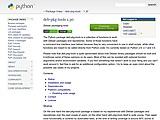 deb-pkg-tools is a Python module for managing Debian packages. It provides for inspecting, building, checking and signing packages, or managing repositories. deb-pkg-tools thereby bases its API on manual meta data parsing or wrapping calls to native tools, such as dpkg, dpkg-deb, lintian, apt-get, apt-ftparchiv, gzip, fakeroot, gpg, dpkg-scanpackages.
deb-pkg-tools is a Python module for managing Debian packages. It provides for inspecting, building, checking and signing packages, or managing repositories. deb-pkg-tools thereby bases its API on manual meta data parsing or wrapping calls to native tools, such as dpkg, dpkg-deb, lintian, apt-get, apt-ftparchiv, gzip, fakeroot, gpg, dpkg-scanpackages.
 Tray notification applet for informing about package updates in Slackware and CLI tool for monitoring upgraded packages.
Tray notification applet for informing about package updates in Slackware and CLI tool for monitoring upgraded packages.
 Slpkg is a powerful software package manager that installs, updates, and removes packages on Slackware based systems. It automatically computes dependencies and figures out what things should occur to install packages. Slpkg makes it easier to maintain groups of machines without having to manually update. Slpkg works in accordance with the standards of the organization slackbuilds.org to builds packages. Also uses the Slackware Linux instructions for installation, upgrading or removing packages.
Slpkg is a powerful software package manager that installs, updates, and removes packages on Slackware based systems. It automatically computes dependencies and figures out what things should occur to install packages. Slpkg makes it easier to maintain groups of machines without having to manually update. Slpkg works in accordance with the standards of the organization slackbuilds.org to builds packages. Also uses the Slackware Linux instructions for installation, upgrading or removing packages.
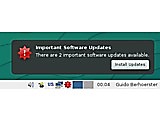 pk-update-icon displays notifications and an icon in the tray area of the panel when package updates are available.
pk-update-icon displays notifications and an icon in the tray area of the panel when package updates are available.
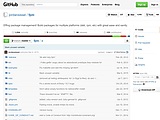 FPM is an incomplex software package build tool. It can import distribution files simply from source directories or zips, and generate RPM, DEB, TAR.GZ, Solaris packages, or OSXpkg from there. It also provides unified command line options for defining dependencies or add common meta attributes.
FPM is an incomplex software package build tool. It can import distribution files simply from source directories or zips, and generate RPM, DEB, TAR.GZ, Solaris packages, or OSXpkg from there. It also provides unified command line options for defining dependencies or add common meta attributes.
 Limba is an experimental cross-distribution package installation scheme. It utilizes file system virtualization (overlayfs) to allow 3rd-party application bundles to run unmodified alongside distro packages. It's a possible successor to Listaller/AutoPackage, integrates with PackageKit and XDG desktop management facilities.
Limba is an experimental cross-distribution package installation scheme. It utilizes file system virtualization (overlayfs) to allow 3rd-party application bundles to run unmodified alongside distro packages. It's a possible successor to Listaller/AutoPackage, integrates with PackageKit and XDG desktop management facilities.
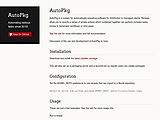 AutoPkg is a Mac OS X software packaging and distribution system for mass deployments to managed clients. Simple task lists or recipes are used for assembling packages, that can include download, extraction, injecting configuration or overrides, versioning and meta data, augment post-install scripts, and distribute them via Munki, Casper, Absolute Manage, etc.
AutoPkg is a Mac OS X software packaging and distribution system for mass deployments to managed clients. Simple task lists or recipes are used for assembling packages, that can include download, extraction, injecting configuration or overrides, versioning and meta data, augment post-install scripts, and distribute them via Munki, Casper, Absolute Manage, etc.
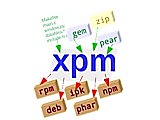 XPM is an experimental branch of fpm (effing package management). Both simplify generating DEB, RPM, OSX, Solaris packages and some language-specific bundle systems. Cross package maker (XPM) adds simpler target building per "-t deb,rpm,ipk" and convenient update filters. It also introduces a Windows EXE target, IPK/Listaller packages, support for PHP Phar archives, Composer bundle to system conversion, and a SRC input filter (for self-contained packaging info in scripting languages). "xpm" is
XPM is an experimental branch of fpm (effing package management). Both simplify generating DEB, RPM, OSX, Solaris packages and some language-specific bundle systems. Cross package maker (XPM) adds simpler target building per "-t deb,rpm,ipk" and convenient update filters. It also introduces a Windows EXE target, IPK/Listaller packages, support for PHP Phar archives, Composer bundle to system conversion, and a SRC input filter (for self-contained packaging info in scripting languages). "xpm" is
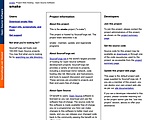 smake is a highly portable 'make' program that makes commands up to date based on rules in Makefiles and on the timestamps of the related files. It implements a complete superset of the features of the classical POSIX/Unix make program. It warns about typical misuse of dynamic macros that prevent portability of makefiles. Its automake features allow you to run scripts to automatically create rules for unknown platforms.
smake is a highly portable 'make' program that makes commands up to date based on rules in Makefiles and on the timestamps of the related files. It implements a complete superset of the features of the classical POSIX/Unix make program. It warns about typical misuse of dynamic macros that prevent portability of makefiles. Its automake features allow you to run scripts to automatically create rules for unknown platforms.
 AppFS is a FUSE-based filesystem that presents a filesystem view of remote packages presented via HTTP for the purpose of running software without the hassle of installing it. Instead, as files are requested they are downloaded and made available.
AppFS is a FUSE-based filesystem that presents a filesystem view of remote packages presented via HTTP for the purpose of running software without the hassle of installing it. Instead, as files are requested they are downloaded and made available.
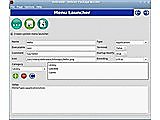 Debreate is a tool that helps building Debian packages (.deb). It provides an easy to use interface to set control and meta information, select files for packaging, dependencies, and add scripts.
Debreate is a tool that helps building Debian packages (.deb). It provides an easy to use interface to set control and meta information, select files for packaging, dependencies, and add scripts.
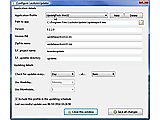 LazAutoUpdate provides a GUI to manage project updates from files and binaries that are hosted on Sourceforge. It provides an application API which can download and install application updates.
LazAutoUpdate provides a GUI to manage project updates from files and binaries that are hosted on Sourceforge. It provides an application API which can download and install application updates.
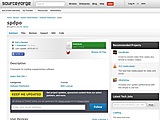 spdpo is an automation script for building FreeBSD and RPM packages. It creates packages based on simple packaging specification files, and also provides tools for importing source distribution tarballs, or managing multiple build specification file collections. It's a simple shell wrapper around rpm or FreeBSD pkgng, that prepares the environment, retrieves sources, unpacks, normalizes filenames, applies patches, configures the build toolchain, builds, installs and postproccesses before creatin
spdpo is an automation script for building FreeBSD and RPM packages. It creates packages based on simple packaging specification files, and also provides tools for importing source distribution tarballs, or managing multiple build specification file collections. It's a simple shell wrapper around rpm or FreeBSD pkgng, that prepares the environment, retrieves sources, unpacks, normalizes filenames, applies patches, configures the build toolchain, builds, installs and postproccesses before creatin
 pax (portable archive exchange) is a standard Unix archiving utility as outlined by POSIX.1-2001 / IEEE 1003.2, to bridge and provide a more universal command line interface. The MirCPIO / paxmirabilis implementation was based on paxtar and is developed by the MirBSD project. It provides -r read and -w write support for cpio, ustar, sv4cpio, ar(5), and the old BSD tar format. paxcpio and paxtar are included for easier transition.
pax (portable archive exchange) is a standard Unix archiving utility as outlined by POSIX.1-2001 / IEEE 1003.2, to bridge and provide a more universal command line interface. The MirCPIO / paxmirabilis implementation was based on paxtar and is developed by the MirBSD project. It provides -r read and -w write support for cpio, ustar, sv4cpio, ar(5), and the old BSD tar format. paxcpio and paxtar are included for easier transition.
|